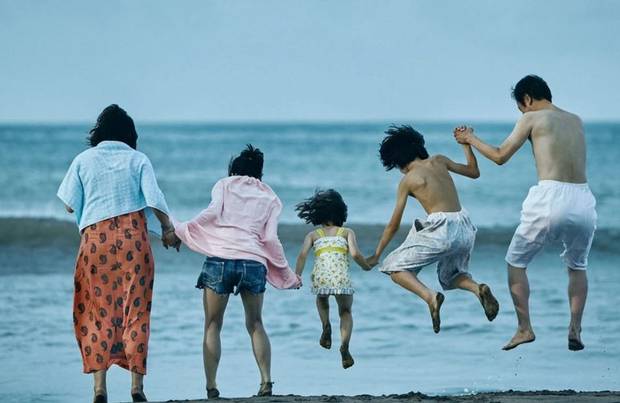When a film is about a crime family, audience expectations tend to involve mobsters and thrills, but that’s not the territory that Hirozaku Kora-eda is exploring here. He opens his tale with a camera tracking leisurely across a Tokyo supermarket. A scrawny man and a young boy are picking out supplies to slip into their bags and take home. There’s very little drama in their thieving, it’s an everyday necessity that they’ve honed into a routine. Kora-eda isn’t going for high tension, there’s just a pause in the subtle jazz-infused soundtrack that allows us to listen to the rustle of packages, the evaded blip of the cash till.
Shoplifters won Kora-eda the Palme d’Or at Cannes and its rightly deserved. It’s a masterpiece that had me in tears at one unexpected point. I also remained fascinated until the very end, trying to work out the exact relationships between the characters. The Shibata family live together in a cramped shack, sleeping, eating noodles and storing stolen goods all in a few square feet. There’s the matriarchal Hatsue, played by Kirin Kiki in one of her last performances before her recent death. Less saintly than the character she played in Sweet Bean, Hatsue gets her money by guilt-tripping the second family of her late husband into giving her handouts from his pension which she then spends in the pachinko parlour. Living with her in the shack are two younger women. One of them works in a laundry and grabs any chance to rummage through the customers' clothes for forgotten valuables; the other displays herself in a peep show for men, watching behind one-way mirrors. Are they sisters or just friends? What's their relationship to Hatsue? And whose son is young Shota (Jyo Kairi), a scruffy lad who has been told that ‘only kids who can’t study at home go to school’. He spends his days casing the security systems in shops in his shabby neighbourhood and drifting along the river bank. Kora-eda regular Lily Franky plays Osamu, the man of the house who loves entertaining children with magic tricks but also has no qualms about exploiting them. He picks up some work as a day labourer on construction sites, but is more productive fencing stolen goods that he’s purloined with Shota. But he can't persuade the boy to call him ‘dad’, despite the clear bond between them. It’s not quite Fagin and his ragamuffins, but it’s not far off when a little girl is added to the household through some dubious sleight of hand. Kora-eda coaxes superb performances from the two child actors who never become cute moppets and remain wholly credible.
Kora-eda regular Lily Franky plays Osamu, the man of the house who loves entertaining children with magic tricks but also has no qualms about exploiting them. He picks up some work as a day labourer on construction sites, but is more productive fencing stolen goods that he’s purloined with Shota. But he can't persuade the boy to call him ‘dad’, despite the clear bond between them. It’s not quite Fagin and his ragamuffins, but it’s not far off when a little girl is added to the household through some dubious sleight of hand. Kora-eda coaxes superb performances from the two child actors who never become cute moppets and remain wholly credible.
Based on a news story, Kora-eda wants to make his audience ask questions about the way the Japanese authorities respond to the kind of poverty that leads to abuse and theft and it could all have become very worthy. But it's a relief that Kora-eda is no Ken Loach. This is no sledge-hammer agit prop drama but a beautifully nuanced portrait created with all the subtlety of Yasujiro Ozu and the energy of the young François Truffaut. Cinematographer Kondo Ryoto subtly deploys frames and mirrors to capture the links between characters and the limitations of their world. The tale moves through the seasons – from icy winter to sweaty summer and takes in locations from grubby city back streets to an epiphanous day on the beach. Over two hours we are immersed in the lives of this unusual family and the underworld they inhabit; at the end we are left dazed and moved.















Add comment